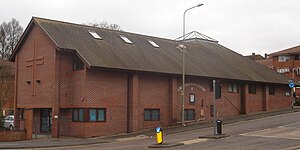 Image via Wikipedia
Image via WikipediaThe group applauded the training offered by the URC to Methodist ministers stationed to LEPs that include both denominations.
Recommendation 1: Methodist Connexion to produce training materials for incoming ministers from other traditions to make them aware of the gifts and graces of Methodism and what we expect from those who are given “authorized” or “associate” status.
Recommendation 2: Methodist Connexion to ensure that the Superintendent's Induction course includes a section on the issues that may occur when they have an LEP in their Circuit.
Some work has already been done to suggest including LEPs in the Superintendent's induction course.
One of the members of the group emailed (below) two people who have responsibility for ministerial training. There is no information yet, about their response.
Follow up to the Training recommendation concerning training materials
As you may know, in 2008 the URC Assembly and Methodist Conference approved a joint resolution which had been proposed by Wolverhampton and Shrewsbury District and the West Midlands Synod. Its main points are as follows:
- To explore further joint working for the sake of shared mission.
- A structure that minimises ecumenical meetings but facilitates diversity
- Exploration of joint structures at Synod / District level
- Effective use of resources.The leaders of the two churches have established a Strategic Oversight Group (SOG) to oversee the work under the joint resolution and have agreed to a joint URC Mission Council and Methodist Council in the autumn of 2010.
The group within which I was working recognised the problems that can arise within LEPs where a minister arrives from one denomination, unaware of the gifts, graces and history of the other traditions within the LEP. Looking specifically at Methodist/URC LEPs we recognised that the URC graciously offer a three day course at their centre in Windermere, whereas we as Methodist appear to do very little, perhaps relying on the Superintendent to take on a training role.
I am writing to ask if either or both of you would be willing to work with me in producing training materials that could be used for ministers of other traditions arriving in a Methodist/URC/xxx LEP. I have only a very rough outline of the scope of the materials but I thought that a starting point might be the EMMTC (East Midlands Ministry Training Course) weekend, which we could use as a basis and then offer some "compare and contrast" sections with the URC as a beginning.
I am particularly keen that we improve the understanding of two key differences (they appear key to me, I'm sure there are others) namely
- lay presidency of holy communion
- the place of authority i.e church council v. church meeting. There are many similarities and strengths which need to be affirmed, but these are two problem areas with which I am struggling at the moment.

No comments:
Post a Comment